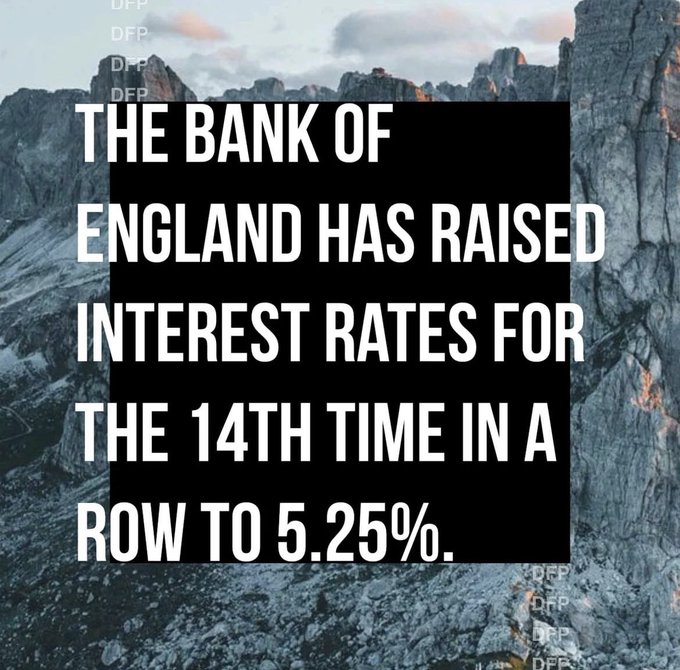For the fourteenth time in a row, the Bank of England has increased its base interest rate by a quarter percentage point to 5.25%. The raise will add pressure on mortgage holders and businesses already feeling the financial squeeze. But the BoE insists the raise is necessary in the fight against inflation, warning the key rate will likely remain high over the coming two years. The bank has also not ruled out further interest rate hikes, with BoE forecasts suggesting rates would peak at 6%, drop back and average at 5.5% between now and 2026.
The rate increase comes despite promising inflation figures indicating price increases had slowed. The consumer price index (CPI) fell to 7.9% in June, the lowest since early 2022. The 14 base rate hikes since 2021 translate into an average mortgage repayment increase of nearly £6,000 for homeowners on tracker mortgages and more than £3,700 for standard variable rate mortgage holders.
Andrew Baily, Bank of England governor conceded that the increases would impact people on low to middle incomes the hardest, emphasizing the quarter percentage hike represented a “restrictive” increase. Some members of the committee setting the rates were in favour of a half percentage point increase.
After the rate increase announcement, Andrew Bailey said:
“We do recognise, and I think it’s very important to say, that inflation has a very serious effect, particularly on those least well off.”
“But I will emphasise that the economy is more resilient. Yes, unemployment has gone up a bit, but it is still at historically low levels. We haven’t experienced a recession and we’re not forecasting one.”
The bank predicts the inflation rate to fall below 5% which is precisely what Rishi Sunak promised during the leadership race. Reacting to the announcement, Chancellor Jeremy Hunt said:
“If we stick to the plan, the Bank forecasts inflation will be below 3% in a year’s time without the economy falling into a recession.”
On Twitter, the Prime Minister posted a ‘reassuring’ message likely to infuriate thousands of people.
I know a lot of people are worried about rising interest rates.
But the alternative would make inflation far worse, so what you buy becomes more expensive & what you save, worth less.
Take a moment to watch this video about why decisive action is needed to control inflation. pic.twitter.com/LifOfEXzuA
— Rishi Sunak (@RishiSunak) August 3, 2023
Protestors outside Bank of England buildings demand windfall tax on exorbitant financial institution profits
Protestors gathered outside the Bank of England headquarters to voice their opposition to the interest rate increase. Campaigners also want the government to #taxthebanks by way of a windfall tax on recent exorbitant profits. Financial institutions have reported record profits in recent months. According to The Independent, HSBC, alongside Barclays, Lloyds Banking Group, and NatWest Group has profited considerably from interest rate hikes charged to mortgage and loan holders. The financial institutions appeared slow to pass on higher rates to savers.
Campaigners this morning held up balloons showing the £28.93 billion profits shared between the big four banks, an 80%-jump from last year’s £16.6 billion.
Positive Money head of campaigns Hannah Dewhirst said:
“We came out today to tell the Bank of England that we’ve had enough of senseless interest rate rises.
“Rate rises are failing to bring down inflation fuelled by international fossil fuel prices and food prices disrupted by climate change. They will only continue to impoverish households and enrich banks.
“What we need are better tools for dealing with inflation than blunt instruments like interest rates, and a windfall tax on bank profits to redress the harm done to workers and families by rate hikes.”
Earlier this month, MP Richard Burgon already raised the issue of imposing a windfall tax on financial institutions, only to receive short shrift from Jeremy Hunt.
Thank you @RichardBurgon for flying the flag for a windfall tax on banks' profit in parliament 🙌
Help us keep the pressure building ✊
Tell Hunt to #TaxTheBanks
👉https://t.co/RiYugO1HNy pic.twitter.com/shR6EZAnhF— Positive Money (@PositiveMoneyUK) July 10, 2023
Meanwhile, Shadow Chancellor Rachel Reeves said:
“This latest rise in interest rates will be incredibly worrying for households across Britain already struggling to make ends meet.
“The Tory mortgage bombshell is hitting families hard, with a typical mortgage holder now paying an extra £220 a month when they go to re-mortgage.
“Responsibility for this crisis lies at the door of the Conservatives that crashed the economy and left working people worse off, with higher mortgages, higher food bills and higher taxes.
“After 13 years of economic failure and managed decline under the Conservatives, it’s time for change. Labour’s plan to build a strong economy will boost growth, increase wages and bring down bills.”
Even seasoned experts like Richard Murphy, economic justice campaigner and accountancy professor, have criticised the Bank of England for unduly shouldering people already strapped for cash with additional financial pressure.
Murphy tweeted earlier today:
“The UK financial services sector will be £2 billion better off in the next year as a result of today’s decision to increase the Bank of England base rate by 0.25%. They did nothing to earn it. The UK now looks like a giant welfare system for its banks and bankers.”




